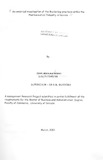| dc.description.abstract | The study objective was to investigate the marketing practices within the
pharmaceutical industry in Nairobi.
The research was conducted between March and August 2001. The sampling
frame comprised one hundred twenty three (123) pharmaceutical firms in Nairobi
dealing with manufacturing and distribution of drugs as listed in the medical
Directory, 2000. Sixty-two (62) firms were selected using simple random
sampling process.
The underlying premise was that lately there has been a hue and cry on the
question of quality and rising cost of pharmaceutical products. Inadequate
regulatory and lengthy bureaucratic procedures have led to inefficient and
insufficient supplies of pharmaceutical products in the public sector.
The Advert of HIV/AIDS has further complicated the issues with the moral
question being asked on whether pharmaceutical firms should be allowed to
profit from Human Misery.
Alongside these, major changes have occurred in the industry which has been
characterized by the exit of multinational manufacturing facilitates, proliferation of
firms and number of products available in the market. Owing to these
challenges, the need for firms to embrace the marketing concept cannot be over
emphasized.
Both primary, and secondary data was collected. Secondary data was obtained
from extensive review of literature, while primary data was collected using
structured and unstructured questionnaire comprising two sections. The
technique for analyzing the data comprised the use of descriptive statistics such
as charts, tables, graphs and percentages.
The study found that although most of the firms were adhering to some of the
marketing concepts, they were far from grasping its full potential.
The firms did not have adequate procedures and systems necessary for
implementation of marketing concepts. The marketing plans were short term and
did not focus of the strategic value of building brands. The author recommends
that marketers should behave like entrepreneurs by creating market driven
strategies by adopting and implementing the marketing concepts rather than
applying it haphazardly, thereby failing to realise its full benefit.
Marketing managers must have factual, market based information that will help
them design innovative ways and strategies on how to keep their market share
and profitability in the short and long term.
The finding reported represent the population of the pharmaceutical industry in
Nairobi that is involved with marketing activities. That is both manufacturing and
distribution firms. It is through the actions and decisions of these respondents
that we are able to measure, learn and make conclusions and recommendations
on the application of marketing concepts | en |

